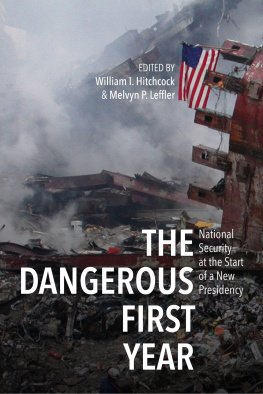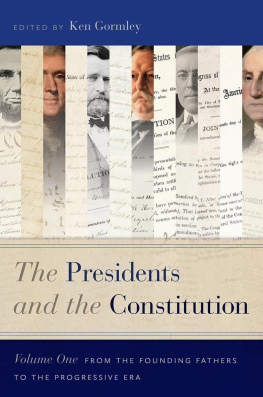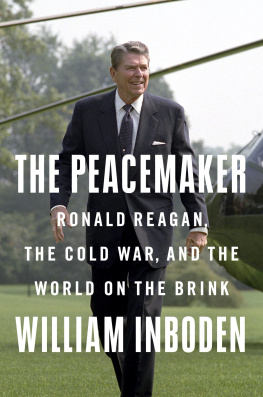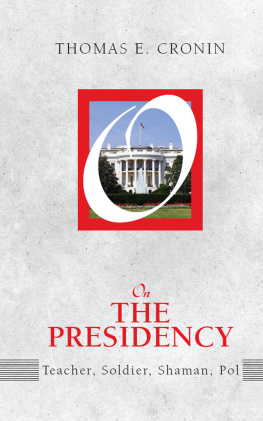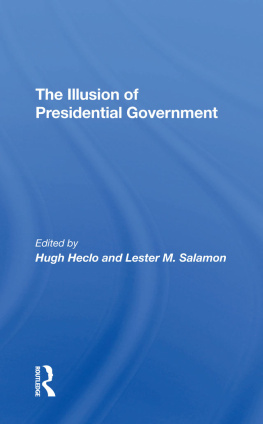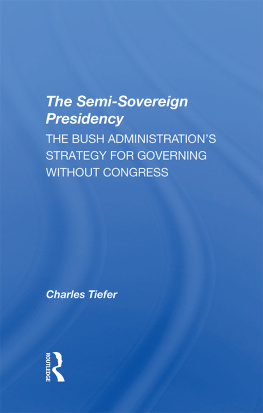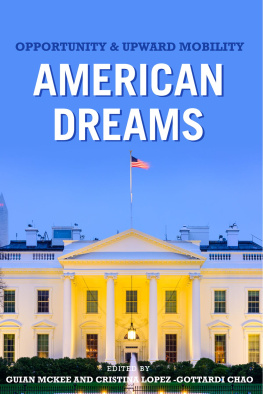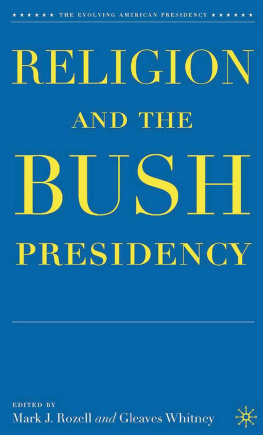Introduction
William I. Hitchcock
Every president faces national security crises. They come in many forms: attacks on the homeland, foreign wars, global economic upheavals, nuclear proliferation, terrorism, and many others. These are the daily problems that cross the presidents desk.
Yet when such crises occur in the first months of a new administrationand they willthe presidential team is often unprepared to handle them. The new chief executive may lack experience in the job. The crises may pose unfamiliar and complex new problems. Or such foreign policy problems may be unwelcome distractions from other priorities on the domestic policy agenda. For all of these reasons, foreign policy crises in the first year of a new presidents term are especially difficult situations to navigate.
The essays in this short volume are drawn from First Year 2017 , a research project conducted by the Miller Center at the University of Virginia. The First Year Project aims to provide historical background and practical expertise on the most important issues facing any incoming presidential administration. This group of essays shines a bright light on the kinds of problems that five previous presidentsJohn F. Kennedy, Ronald Reagan, George H. W. Bush, Bill Clinton, and George W. Bushfaced in their first years. And they offer some crucial insight into and advice on how best to prepare for such crises when they come.
What common themes run through the essays, and what common mistakes do they reveal? As we show here, new presidents tend to rely for foreign policy advice on staff from the election campaign or other party loyalists and fail to surround themselves with the best and most experienced experts. They tend to consider the ongoing policies of the previous administration as flawed, rather than evaluating them on the merits. They tend to assume that political victory at the ballot box will translate into political capital overseas, and therefore adopt a robust and confrontational tone in world affairs that proves counterproductive. They often fail to see that foreign policy crises will shape their presidency, and prefer to concentrate on domestic initiatives that seem more pressing to their constituents.
While every presidency differs in the nature of the crises confronting the country, we found presidents often face many of the same management and leadership problems when dealing with national security crises in their first year. These problems can be summarized by five key words: goals, staff, information, focus, and restraint.
Goals
Presidents must know before they enter the Oval Office what they want to accomplish in foreign policy and must communicate those goals effectively to the bureaucracy and to the public.
Our project shows that perhaps the best at this was the great communicator, Ronald Reagan. What did he want to do? To end the Cold War, and maybe eliminate nuclear weapons. At the time, his advisers thought that goal unrealistic. Reagan didnt. He stuck with his broad ambitions, with, of course, dramatic results.
By contrast, Bill Clinton was not very good at communicating what he wanted to achieve in foreign policy. He used inflated rhetoric about engaging civil society but provided few specifics, and did not think about foreign policy much at all before he took office. His presidency suffered for it.
Why does this matter? It matters because in the first months, a new president will be confronted by many crises, both domestic and foreign, and will tend to overreact, jumping on the first crisis that appears and seeing it as a test of his or her skill. But this can lead to trouble and confusion, and draw the president away from his or her main goals.
Staff
Probably the hardest task for a new president is making the transition from the excitement of the campaign to the work of governing.
During the campaign, the candidate listens to political advisers and campaign staffers. But after the election, a new expert team must be created. Who will be the presidents point person on foreign affairs? Will that person be a member of the inner circle and have the presidents ear? Will he or she share the presidents goals?
A lot of good presidents handle the staff issue badly in the first year.
John Kennedy appointed Dean Rusk secretary of state. Rusk was a cautious, mild-mannered professional who never really had much clout in the cabinet. McGeorge Bundy and Robert McNamara, with much stronger personalities, were able to circumvent Rusks advice and overshadow him personally. The lack of clear roles for the staff weakened the team and hurt the president.
George W. Bush made precisely the same error: he appointed Colin Powell to head the State Department but gave the real power over national security matters to his vice president, Dick Cheney, and his defense secretary, Donald Rumsfeld. Both Presidents Kennedy and Bush 43 were not well served by having divisions within the national security team.
Likewise, Ronald Reagan made a bad choice in selecting Al Haig as his secretary of state, and he compounded the mistake by not getting rid of Haig fast enough when he disagreed with Reagans main foreign policy objectives. But Reagan corrected the mistake by bringing on board the best secretary of state since Dean Acheson, George Shultz.
Finding the right people, making sure they share the presidents goals, and giving them power and authority within the bureaucracy: these are crucial to first year success.
Information
A new president and his or her staff must know: how does the president get information? Not just classified intelligence, but other kinds of information as well? Then, what does he or she do with it? How is policy developed? How is it implemented?
One of the more interesting themes to emerge from the essays is that todays policymaking process is far less efficient and effective than earlier models. In the 1950s, under Eisenhower, the routine of policymaking worked well. A powerful National Security Council, whose meetings were chaired weekly by the president, read and discussed policy papers, and then assigned implementation to specific officers. In the Kennedy years, this kind of rigid planning was tossed aside. Kennedy liked to improvise. The result was lack of clarity and poor implementation.
The problem was not adequately addressed until George H. W. Bush and his national security team, led by Brent Scowcroft, imposed order, and above all, put only the really important issues on the presidents desk. These Bush focused on in detail, and gave key issues his personal stamp. The contributors to this book also note that Robert Gates, Bushs deputy national security adviser and later CIA director, was among the most gifted formulators of policy proposals because he knew how to think through the process and get key issues before the president in a clear and precise manner.

